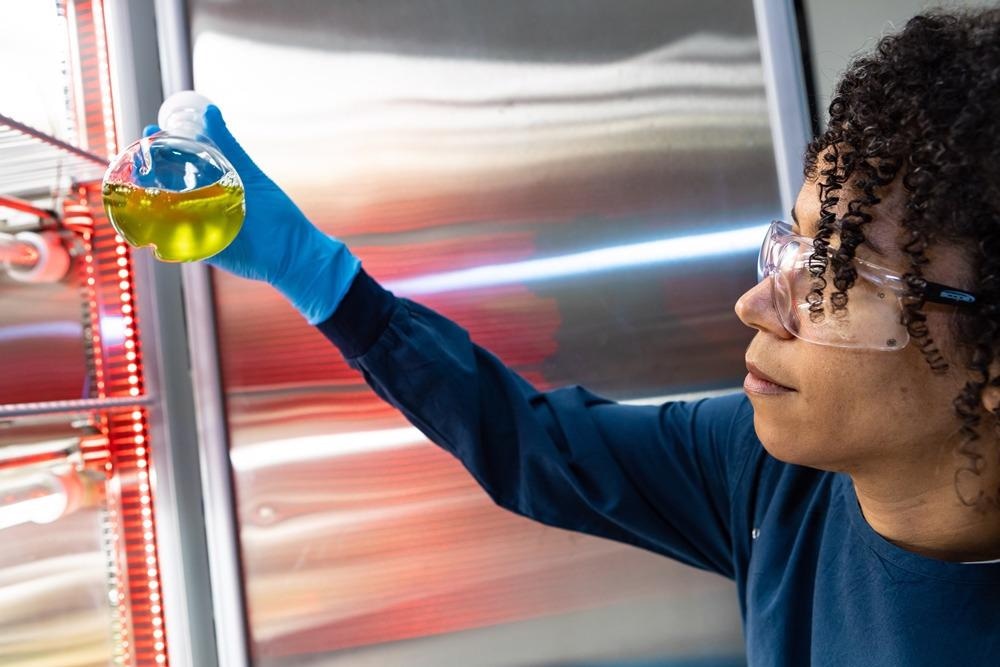Australia’s national science agency, CSIRO, will invest $50 million over the next five years in four new programs to drive critical breakthroughs in tough national challenges.
 With a suite of specialist equipment to meet the needs of bioengineering projects, the CSIRO BioFoundry provides capability to industry and the research community. Image Credit: CSIRO
With a suite of specialist equipment to meet the needs of bioengineering projects, the CSIRO BioFoundry provides capability to industry and the research community. Image Credit: CSIRO
The programs are part of CSIRO’s $200 million portfolio of Future Science Platforms (FSPs), programs that push the boundaries of existing research through collaboration with universities and industry.
- The Revolutionary Energy Storage Systems FSP will reimagine Australia’s electricity grid from one designed to support fossil fuels to instead incorporate more sources of renewable power.
- The Permanent Carbon Locking FSP will harness biology, chemistry and engineering to drive innovation in carbon capture and carbon storage science.
- The Immune Resilience FSP will build on the accelerated understanding of human and animal immune systems gained from COVID-19 to develop technologies that prevent, protect, and respond to emerging health threats.
- The Advanced Engineering Biology FSP will deliver new tools to develop fast-tracked solutions for some of the most pressing challenges of this century – from food security to health and wellbeing and carbon-neutral industries.
CSIRO’s Chief Scientist Professor Bronwyn Fox said the new FSPs will bring together industry and science, including early career researchers, to invent the cutting-edge science that will shape our future.
“CSIRO’s Future Science Platforms are a big part of our strategy to stay at the forefront of discovery,” Prof Fox said.
“They are a critical part of the way we do science – they are our investment in cutting-edge, transformative research where we push the boundaries of science and lean into the seemingly impossible.
“The foundational research that these four new Future Science Platforms will undertake will pave the way for innovations and catalyse new industries that will help us to better manage our health, food security, natural resources and environment in the decades to come.”
Dr Adam Best, Interim Director of the Revolutionary Energy Storage Systems FSP, said disruptive change is crucial to meeting future energy needs safely, efficiently and sustainably.
“Unlocking the secret to efficient and safe energy storage could see us charge electric vehicles as easily as we now fill our petrol tanks, or keep portable our devices charged for many days without the need for a top up,” Dr Best said.
“On a larger scale, it could even be mimicking pumped hydro through new technology and making it more responsive to the needs of the grid.”
Dr Andrew Lenton, Director of the Permanent Carbon Locking FSP, said research would focus on accelerated atmospheric carbon removal and permanent carbon storage, and integrating these in novel ways.
“If we are to avoid the worst impacts of climate change, breakthroughs and innovation in permanent carbon removal from the atmosphere is needed,” Dr Lenton said.
“The future science and capability developed in this FSP have the potential to underpin new industries and reshape existing industries for Australia and beyond, with CSIRO’s science at the centre.”
Dr Tim Doran, Interim Director of the Immune Resilience FSP, said new and emerging science could enable solutions that harness immune responses to better tackle diseases.
“The rapid acceleration in immune-based technologies in recent years has opened up so many biotech opportunities, and we want to build on that momentum,” Dr Doran said.
“This innovative research will further unravel the complex nature of immune systems and develop new strategies to enhance immune resilience in both humans and animals.”
Dr Colin Scott, Interim Director of the Advanced Engineering Biology FSP, said developing powerful new tools for biological design and prototyping will supercharge the delivery of impactful new goods and services.
“This research will help deliver the 50,000 jobs and $30 billion a year that have been identified in the CSIRO Synthetic Biology Roadmap,” Dr Scott said.
“This is a really exciting time for the bioeconomy in Australia. We are seeing significant growth in start-ups and in the wider innovation ecosystem. Increased investment in this research area will help ensure that Australia is a world leader in engineering biology.”
CSIRO’s $200 million portfolio of Future Science Platforms includes 20 programs that underpin innovation and have the potential to help reinvent and create new industries for Australia.